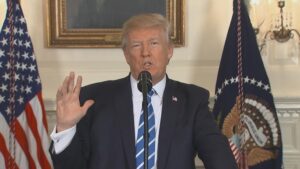President Trump's new tariff program is under legal scrutiny, but historical precedent and initial economic signs suggest it could ultimately strengthen U.S. industries and labor.
Trump’s Tariff Strategy Faces Legal Hurdles but Boosts Economic Prospects

Trump’s Tariff Strategy Faces Legal Hurdles but Boosts Economic Prospects
Legal challenges by Democratic attorneys general are underway against President Trump's tariffs, yet early indicators show potential benefits for American workers.
President Donald Trump's ambitious tariff initiative, designed to rectify longstanding trade disparities, is now encountering legal opposition from a coalition of Democratic state attorneys general. They argue that the tariffs exceed the president's authority, imposed without the backing of Congress.
Nevertheless, the Trump administration maintains that the tariffs align with the executive powers granted by historic trade laws, such as the Trade Expansion Act of 1962 and the International Emergency Economic Powers Act. These laws authorize the executive branch to act decisively when national interests are at stake.
Historically, tariffs have been an effective economic tool in the U.S., particularly before the 20th century. Figures like Abraham Lincoln and Theodore Roosevelt promoted tariffs to foster domestic industry and protect American workers from external competition. Recent examples during Trump's first term, including tariffs on steel and aluminum, have demonstrated a positive impact by revitalizing certain sectors and encouraging job creation.
Trump's administration champions the notion that "free trade" is only valid when it is fair. The tariffs target nations like China and Vietnam, which have, according to U.S. officials, exploited trade regulations to undermine American commerce. Early responses from over 130 countries striving to renegotiate trade terms indicate that assertive diplomacy may yield results more effectively than protracted negotiation processes.
While the lawsuits from Democratic attorneys general progress, Trump's tariff strategy might not only reflect a return to historical economic practices but may also prove advantageous for American manufacturing. As factories resume operations and international partners reconsider previous agreements, early indicators suggest Trump's tariffs may indeed be generating positive outcomes for the U.S. economy.




















